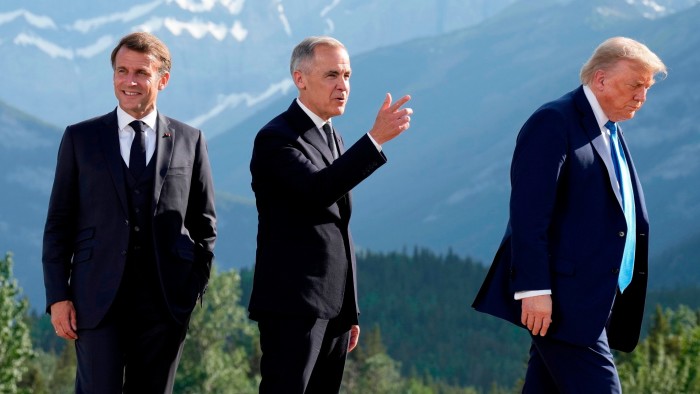Unlock the White House Watch newsletter for free
Your guide to what Trump’s second term means for Washington, business and the world
An Irish exit. That is how comedian Jordan Klepper referred to the US president’s premature departure from the G7 summit this week. Sometimes called a French exit, or when in France, filer à l’anglaise, to describe leaving a party early without a fuss or saying goodbye.
It’s always been my preferred option at a social gathering because it seems polite not to draw the host’s attention to the fact that people are leaving. However, this being Donald Trump and not a party but a gathering of world leaders, he made his excuses to reporters, saying he needed to be “back as soon as I can . . . I wish I could stay for tomorrow, but they understand, this is big stuff”.
His excuse? Fixing the Middle East. Which begs the question, what is the G7 for if not sorting out global crises? Later, he doubled down on his noisy exit, taking a swipe on his social media platform Truth Social at Emmanuel Macron, who he said “always gets it wrong”, before signing off “Stay tuned”.
Some have suggested the reason for leaving was his annoyance at the French president and wanting to miss talks with Ukraine’s President Volodymyr Zelenskyy. Others, that the meeting dragged on. A UK official told the FT that Trump was impatient to “get on with doing something productive”. Or maybe he’d just had enough?
“M-exit” is a strategy recommended by Trump’s erstwhile bro-mantic partner, Elon Musk. In 2018, Musk sent an email to Tesla employees with the productivity tip: “Walk out of a meeting or drop off a call as soon as it is obvious you aren’t adding value. It is not rude to leave, it is rude to make someone stay and waste their time.”
Steven Rogelberg, psychologist and author of The Surprising Science of Meetings: How You Can Lead Your Team to Peak Performance, tells me that when someone turns up late, it engenders bad feeling. But he is more sanguine about leaving early, suggesting that while it could be considered uncivil, it is also constructive for the organisation.
It also depends on the person doing it, he says. “Research on narcissistic leaders, in general, consistently finds that they privilege their needs over others’ interests due to their desire for dominance and that they generally do not care or value others’ needs unless it advances their personal self-centred agenda.” Leaving early does not always represent such behaviour, he adds.
Maybe Trump has done everyone a service. Next week’s planned three-day Nato meeting is now cut to a two-and-a-half-hour session to avoid the same thing happening again.
There is a particular joy in leaving a wasteful meeting early. Haven’t many of us checked out of Zoom meetings, even as we are still logged on, and is that any wonder? According to new data from Microsoft, the fastest-growing type of online gathering has more than 65 participants, with a 35 per cent increase over the past four years in those spanning multiple time zones. To accommodate this, the number held after 8pm for at least some of attendees is up 16 per cent on the previous year.
As Derek Thompson wrote in The Atlantic magazine last year: “Today, knowledge work is, quantitatively speaking, less about creating new things than it is about talking about those things.” There are fewer hot topics than meetings. This year, Jamie Dimon, chief executive of JPMorgan, sparked much debate when he told staff to “kill meetings”.
There’s a lot of politics involved in meetings. One friend used to have an arrangement with a colleague that if she wasn’t out of the room in 20 minutes, they should interrupt with an urgent call. So many of her meetings seemed to be power plays by a Machiavellian boss, who would cram the day with pointless ones only to exclude her deliberately from the most important. It turned out that sometimes, the only thing worse than being in a meeting is not being in a meeting.
